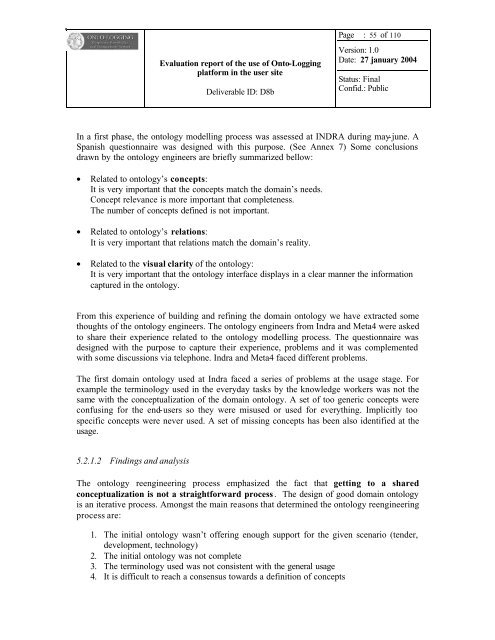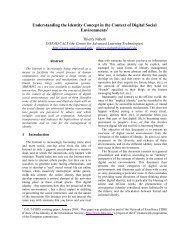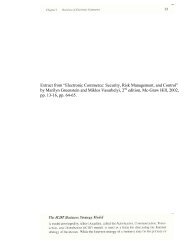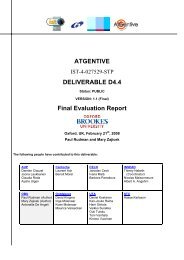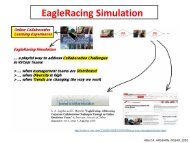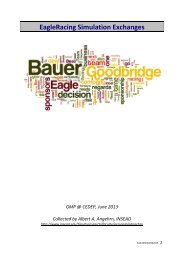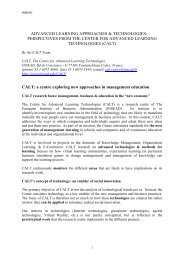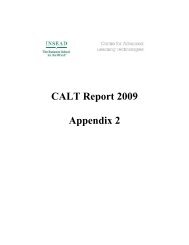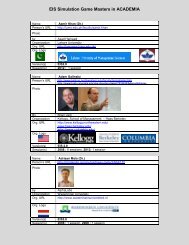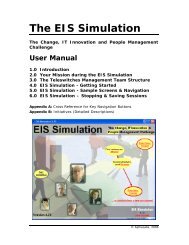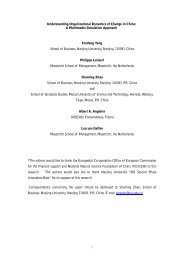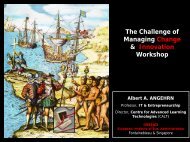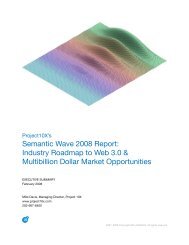pdf 820Kb - INSEAD CALT
pdf 820Kb - INSEAD CALT
pdf 820Kb - INSEAD CALT
Create successful ePaper yourself
Turn your PDF publications into a flip-book with our unique Google optimized e-Paper software.
Evaluation report of the use of Onto-Logging<br />
platform in the user site<br />
Deliverable ID: D8b<br />
Page : 55 of 110<br />
Version: 1.0<br />
Date: 27 january 2004<br />
Status: Final<br />
Confid.: Public<br />
In a first phase, the ontology modelling process was assessed at INDRA during may-june. A<br />
Spanish questionnaire was designed with this purpose. (See Annex 7) Some conclusions<br />
drawn by the ontology engineers are briefly summarized bellow:<br />
• Related to ontology’s concepts:<br />
It is very important that the concepts match the domain’s needs.<br />
Concept relevance is more important that completeness.<br />
The number of concepts defined is not important.<br />
• Related to ontology’s relations:<br />
It is very important that relations match the domain’s reality.<br />
• Related to the visual clarity of the ontology:<br />
It is very important that the ontology interface displays in a clear manner the information<br />
captured in the ontology.<br />
From this experience of building and refining the domain ontology we have extracted some<br />
thoughts of the ontology engineers. The ontology engineers from Indra and Meta4 were asked<br />
to share their experience related to the ontology modelling process. The questionnaire was<br />
designed with the purpose to capture their experience, problems and it was complemented<br />
with some discussions via telephone. Indra and Meta4 faced different problems.<br />
The first domain ontology used at Indra faced a series of problems at the usage stage. For<br />
example the terminology used in the everyday tasks by the knowledge workers was not the<br />
same with the conceptualization of the domain ontology. A set of too generic concepts were<br />
confusing for the end-users so they were misused or used for everything. Implicitly too<br />
specific concepts were never used. A set of missing concepts has been also identified at the<br />
usage.<br />
5.2.1.2 Findings and analysis<br />
The ontology reengineering process emphasized the fact that getting to a shared<br />
conceptualization is not a straightforward process . The design of good domain ontology<br />
is an iterative process. Amongst the main reasons that determined the ontology reengineering<br />
process are:<br />
1. The initial ontology wasn’t offering enough support for the given scenario (tender,<br />
development, technology)<br />
2. The initial ontology was not complete<br />
3. The terminology used was not consistent with the general usage<br />
4. It is difficult to reach a consensus towards a definition of concepts


